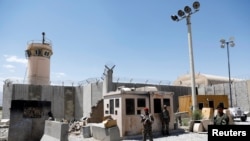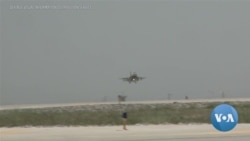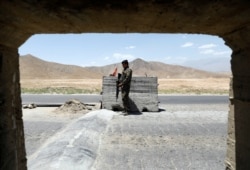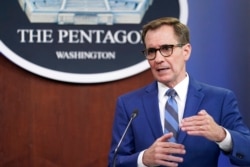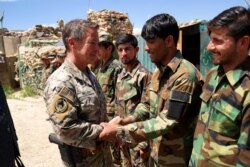Almost 20 years after the United States first went to Afghanistan, and just months after President Joe Biden announced his intent to pull all combat troops from the country, the U.S. withdrawal is nearly complete, with America's military presence limited largely to the capital of Kabul and the nearby international airport.
Multiple U.S. officials said Friday that the vast majority of troops and equipment have been pulled from Afghanistan, with the rest expected to leave by the end of August, slightly ahead of the early September deadline set by Biden in April.
"We're on track exactly as to where we expected to be," Biden said, when questioned repeatedly about the developments while trying to talk up the latest U.S. jobs report.
"We were in that war for 20 years, 20 years," he added, calling the drawdown "rational," before trying to change topics by telling reporters, "I want to talk about happy things."
Other U.S. officials also conceded the somber nature of the U.S. pullout, acknowledging that the situation on the ground has deteriorated as the American footprint has shrunk.
"The president has long felt, as many Americans have, as many leaders have, that the war in Afghanistan was not one that could be won militarily," White House press secretary Jen Psaki said Friday, arguing that a pre-withdrawal assessment "did not sugarcoat what the likely outcomes would be."
Violence across Afghanistan has surged since the U.S. began its withdrawal, with the Taliban insurgency overrunning dozens of districts across the country, practically doubling the amount of territory it controls, according to an analysis by the Foundation for Defense of Democracies' Long War Journal.
Casualties have also risen, with the Afghan government and Taliban officials claiming ever higher death tolls on the battlefield.
Friday, however, seemed to mark a milestone for the decadeslong conflict, with U.S. officials confirming to VOA that American and coalition forces had left Bagram Airfield for the last time, turning it over to Afghan security forces.
For nearly the entire span of the U.S. war in Afghanistan, the base, 60 kilometers north of Kabul, served as the center of the U.S. fight to remove Taliban forces from power and take down the al-Qaida terrorists responsible for killing thousands of Americans on September 11, 2001.
"Bagram was a key hub for air support for everything that we were doing over there for the last 20 years," Pentagon press secretary John Kirby told reporters Friday.
"I wouldn't describe it as the end of a chapter," he said. "But we don't need that kind of capability right now."
Instead, Kirby said, the Pentagon will focus most of its attention on Kabul and the surrounding areas, including Kabul airport, where U.S. forces will join with Turkey, at least for the near term, to provide security.
U.S. forces will also concentrate on protecting the ongoing U.S. diplomatic presence in Kabul, advising and assisting Afghan government forces, and providing support for Washington's counterterrorism efforts against groups such as al-Qaida and Islamic State-Khorasan.
Kirby also said the commander of U.S. forces in Afghanistan, General Austin "Scott" Miller, would remain in the region and retain the authority to launch airstrikes in support of Afghan forces for the time being.
Other changes, though, are coming.
The Pentagon announced Friday that U.S. Defense Secretary Lloyd Austin approved a plan to transfer combat authorities from Miller to General Kenneth "Frank" McKenzie, the U.S.-based commander of U.S. Central Command, later this month.
It is also establishing a Kabul-based military office, U.S. Forces Afghanistan-Forward, to lead security efforts for the U.S. diplomatic presence, and adding a military office in Qatar to coordinate financial support to the Afghan security forces and help facilitate maintenance needs for the Afghan air force.
However, not all details have been worked out.
U.S. officials say they are engaging in ongoing talks with Afghanistan's neighbors about securing basing agreements and other rights, which might allow military planners to position assets such as drones and aircraft nearby to make it easier to conduct counterterrorism strikes if needed.
"It's more important for us to do this right and to make sure that the solutions are sustainable over time than it is to just slap a solution on it," Kirby said. "We're confident that in working in concert with our colleagues at the State Department, we're confident that we're going to get there."
'Positive step'
Taliban spokesman Zabihullah Mujahid on Friday welcomed the announcement that the U.S. had finally vacated Bagram Airfield, describing it as a sign of things to come.
"We consider this withdrawal a positive step. Afghans can get closer to stability and peace with the full withdrawal of foreign forces," he told VOA, adding that the withdrawal was also beneficial for both the Americans and the Afghans.
Pro-Taliban social media outlets also erupted in celebration as soon as reports of the U.S. military vacating Bagram became public early Friday, declaring it an insurgent victory.
Analysts added that the changes, especially the U.S. departure from Bagram, cannot be overlooked.
"Its grandeur and command, at its peak, once symbolized American dominance in the country," said Tamim Asey, executive chairman of the Kabul-based Institute of War and Peace Studies.
"Now, its empty camps, with equipment that Afghans can't operate or maintain because it is too costly, symbolizes abandonment and defeat," Asey said. "It symbolizes everything that has gone right and wrong with the American intervention in Afghanistan."
VOA's Ayaz Gul contributed to this report.




